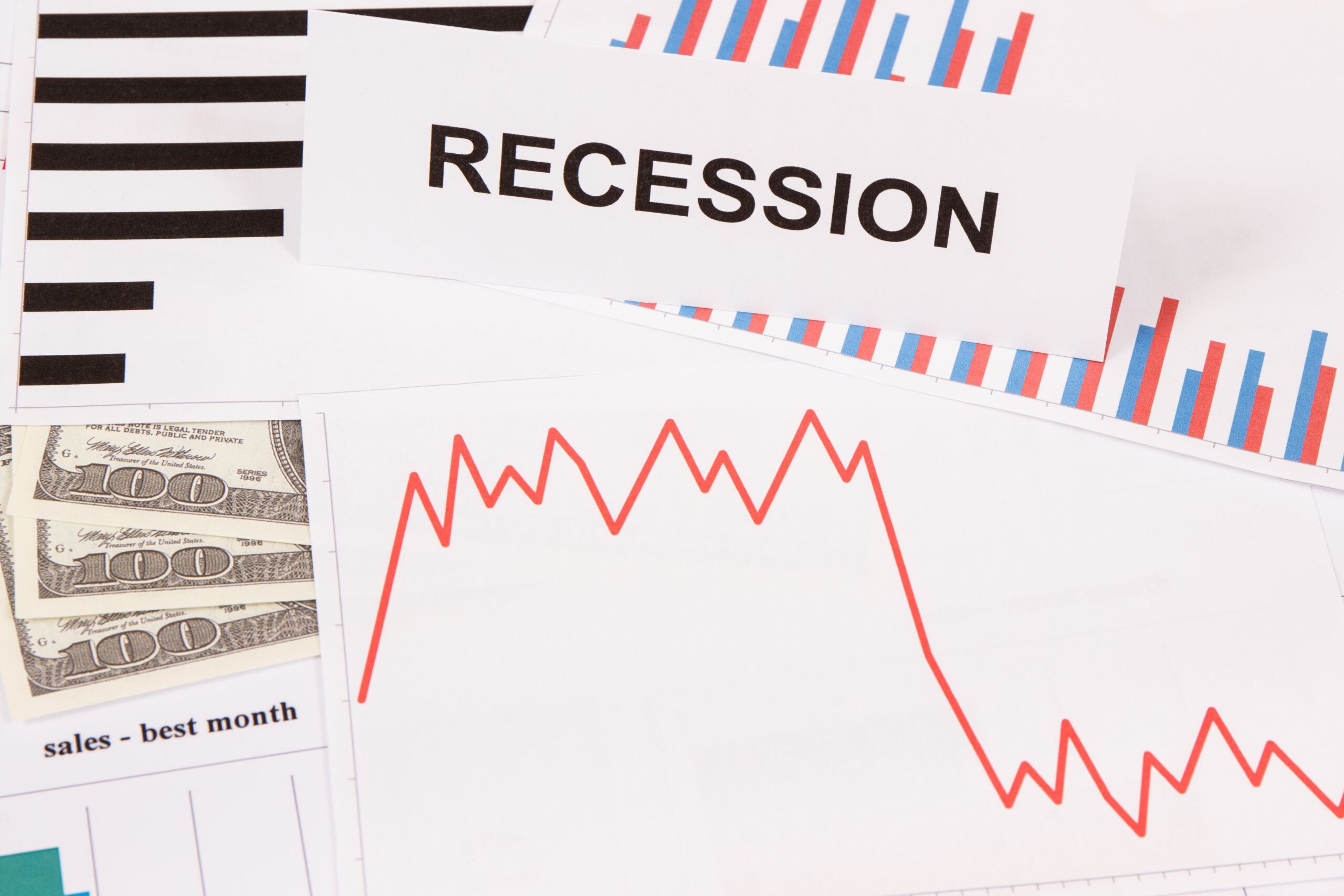Being a business owner is not for the faint of heart. If you are in business long enough, you will experience the joys and the difficulties of multiple economic cycles. The majority of economists agree that the United States will experience a recession of some degree in 2023. Luckily, there are numerous things that you can do to maintain a thriving business during a recession. There’s a saying that goes, “The best time to plant a tree was 20 years ago. The second-best time is now.” So, this article will provide five tips you can follow to recession-proof your business.
Will There Be a 2023 Recession?
The National Bureau of Economic Research defines a recession as “A significant decline in economic activity spread across the economy, lasting more than a few months, normally visible in real GDP, real income, employment, industrial production, and wholesale-retail sales.” A more specific definition defines a recession as two consecutive quarters of decline in the GDP.
According to Annie Lowry, an economic policy reporter for the Atlantic, “Any time inflation has been this high and unemployment this low in the past seven decades, a recession has followed within a year or two. Six out of the last seven downturns were preceded by spikes in the price of gasoline.”
Inflation is indeed high. The June Consumer Price Index (CPI) inflation report shows that the 12-month change in inflation is at 9.1%. This statistic tells us that The Federal Reserve’s efforts to slow down the economy through two different interest rate hikes have not had a measurable effect on inflation.
Nearly 70% of the economists in a new survey conducted by the Financial Times and the Initiative on Global Markets believe that there will be a recession at some point in 2023, with 38% predicting that a recession will start during the first two quarters of that year, and 30% forecasting an official start in the second half.
Related: Will There Be a 2023 Recession? 3 Determining Factors and How You Can Prepare

What Happens to a Business During a Recession?
Here’s the thing—a recession isn’t the worst thing that can happen to a business. Simply put, a recession is the economy’s way of returning to balance after an inflationary period. And according to the latest CNBC CFO Council survey, over 40% of chief financial officers cite inflation as the number one external risk to their business.
Inflation often begins with a shortage of goods and services, which increases costs and causes businesses to raise their prices. If you are a business owner, you know that upward price adjustments become cyclical during an inflationary period. This makes it harder for businesses to reach their margins and be profitable. In addition, employees become more expensive since price inflation typically requires wage inflation. So, depending on your business, current inflation may be worse than an upcoming recession.
In a recession, business owners of all scales typically experience reduced sales, fewer lending options (because lenders tend to have a lower risk tolerance), potential layoffs, and more. Unsurprisingly, recessions affect businesses differently depending on their size and niche. Small businesses (fewer than 500 employees) are the most vulnerable.
According to Investopedia, “The main reason small businesses tend to fare worse than large ones in a recession is that they’re less able to withstand a drop in sales amid mounting economic uncertainty.” Larger corporations have more options for how they can withstand the pressure. Regardless of your business’ size, the following five tips will help you mitigate the negative effects on your business during a recession.

5 Tips to Have a Thriving Business During a Recession
1. Have a Rainy-Day Fund
It is just plain sense to have an emergency fund for your personal life, so why wouldn’t you have one for your business? Saving for a rainy day is an act of service to your employees, customers, and yourself. The recommended amount you should save varies—most professionals advocate for around 3-6 months of expenses. If you invest in rental properties, the same wisdom applies to you. It’s essential to have a cushion in the chance of a vacancy, late payment, or eviction. Regardless of your business venture, your emergency fund serves as your first line of defense!
2. Be Willing to Pivot
One main factor distinguishing successful people is their ability to respond to change. You may have heard it said that the only constant in life is change. Business owners can’t afford to become too comfortable. Circumstances will demand change, and God may prompt you to move in another direction at any time. Our WealthBuilders team had to pivot during the Covid-19 pandemic. One of our key activities is hosting live events, but social distancing regulations made gathering in-person impossible. So, we pivoted. We pushed back the date of our Real Estate Workshop that year to keep our customers safe and offered a live-streaming option.
If one of your revenue streams suddenly becomes impossible, be creative and pivot. What are other ways you can offer your products or services? How can you safely work around restrictions to keep cash flowing into your business? If you want a recession-proof business, you must be willing to pivot. Profit is made by solving problems—not running from them.
3. Take a Hard Look at Your Expenses
Again, this is a principle that can apply to your personal life as well. When people struggling with debt come to me, I always instruct them to look honestly at their expenses. If they can lower their costs, they can apply the money they save to debt payments.
You should do the same with your business: what are ways you spend money unnecessarily? This might not be obvious at first, so dig into your books. Measure the cost of your key resources regarding the profit they produce. Evaluate your subscription services, too—are there any programs you simply don’t need anymore? Make sure you don’t sacrifice the quality of your business–only cut out unnecessary expenses.

Canlis Restaurant
4. Provide Value
You should always be on the lookout for ways to provide the most value to your customers and clients. Each unique circumstance offers more opportunities to provide value. This may bring in new customers, but most importantly, it will solidify your relationship with your current customers. If you can have a thriving business during a recession, you will be in a unique position to help your community thrive.
One restaurant did this extraordinarily well during the pandemic. Canlis is a family-owned, fine-dining restaurant in the heart of Seattle. The first reported Coronavirus case was from Washington State; consequently, Canlis closed quickly. Brothers Mark and Brian Canlis promptly realized there was not much need for a fine-dining restaurant in a pandemic. So, they revisited their mission: to inspire people to turn to one another. They realized that their brand wasn’t about what they were doing but rather why they were doing it.
In a year, they guided their restaurant through several costume changes. They morphed into a burger stand, a bagel shed, a drive-in movie theater, a crab shack, and a sustainable produce delivery service. One of their most ambitious (and successful) ventures was Canlis Community College, an educational platform that offers free virtual classes on food, wine, fitness, life skills, history, and more to the general public. Their business is a testament to the fact that businesses can bring the Kingdom’s unity and creativity to earth! They also underlined a fundamental business principle—when you are stuck on how to bring new value to the marketplace, revisit your mission.
5. Have a Contingency Plan
A contingency plan is a course of action your business can take if an unexpected, disruptive event happens. You never know when a crisis will occur, so it’s important to be prepared to control the aspects of your business that you can control. Consider potential problems in your field, such as a natural disaster, employee resignations, and/or supply chain issues. Then, create a backup plan that could keep your organization operable and sustainable in an emergency.
Your contingency plan will never be 100 percent accurate. Forced change is unpredictable. However, the thought and creativity you put into these plans will make the previously mentioned tips easier to implement!
One of the most challenging things about being a business owner today is the current economy. If you want to learn more about how to have a productive business during a recession, The WealthBuilders Business Development and Nonprofit Workshop is for you. Click here to learn more about how you can join in-person or via livestream August 19th-21st, 2022.




Wow Thanks for this guide i find it hard to obtain excellent knowledge out there when it comes to this subject material appreciate for the post site
Wow Thanks for this blog post i find it hard to obtain smart important information out there when it comes to this material appreciate for the publish site
link:Wow Thanks for this guide i find it hard to unearth great material out there when it comes to this subject matter appreciate for the thread website
Wow Thanks for this review i find it hard to obtain smart ideas out there when it comes to this content thank for the write-up site
Wow Thanks for this review i find it hard to identify smart important information out there when it comes to this subject material thank for the thread website
Thanks for writing this interesting article. I discovered some really valuable points here. Great job, and I hope to see more from you again.